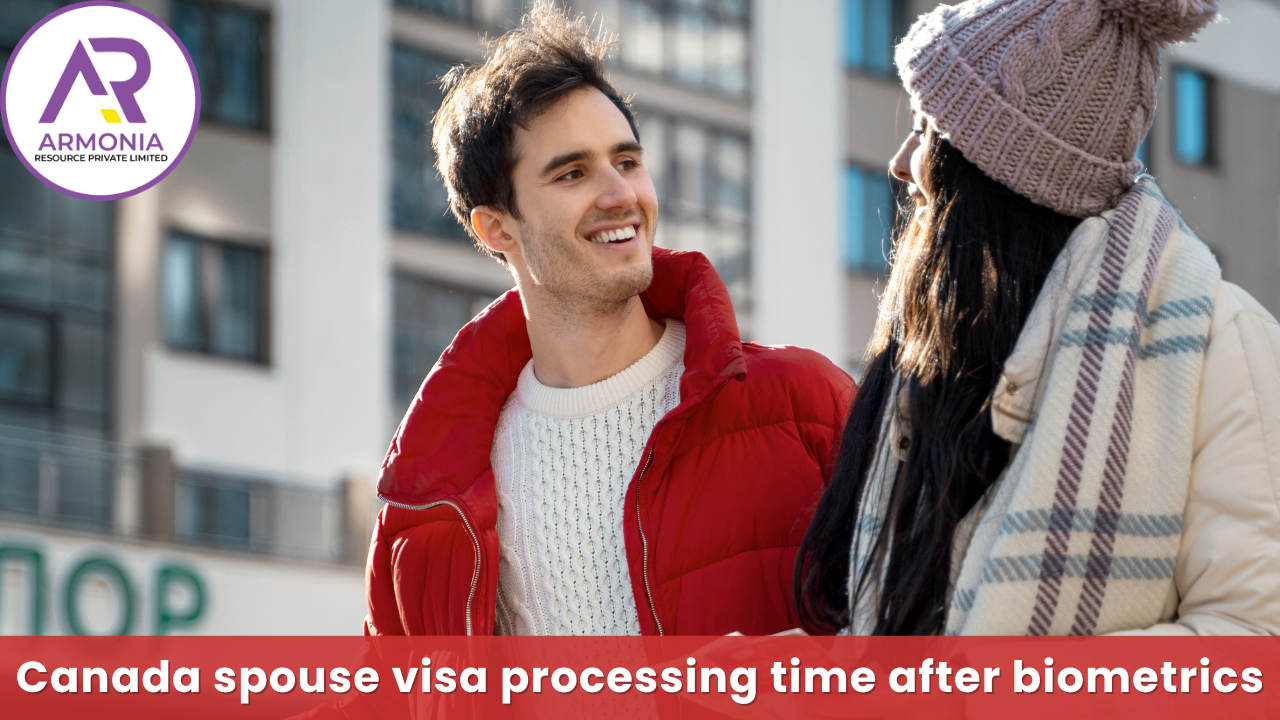Canada spouse visa processing time after biometrics

When you apply for a spouse-sponsorship visa (permanent residence) to join your spouse/partner in Canada, one of the key steps is submitting biometrics (fingerprints + photo). Once you have given biometrics, your application enters the next phase: background checks, document verification, medical checks (if required), and final decision.
Because biometrics completes a mandatory part of your submission, the “clock” for final processing effectively starts after that (assuming your application was otherwise complete).
That means — when you see people ask “How long after biometrics till spouse-visa approval?” — This blog is all about answering that.
Typical processing times (2025 estimates) after biometrics
Because every case is different, exact durations vary. But recent data gives a general range depending on type of application (in-Canada vs outside Canada) and other factors.
|
Application type / Situation |
Typical processing time after biometrics* |
|
Spouse / common-law partner sponsored from outside Canada (Outland) |
10 to 13 months |
|
Spouse sponsorship filed from inside Canada (Inland) |
12 to 18 months (some complex cases may take longer) |
|
Well-prepared applications with clear documentation/history |
Often toward lower end of range (closer to 10–12 months) |
These ranges include the time for biometrics + background checks + all processing steps until final decision.
Official public data from IRCC (excluding certain regions) confirms around 10–13 months for many out-of-Canada spouse sponsorship applications.
Why timing can vary — what influences processing speeds
Even if you’re “within the norm,” your wait can be shorter or longer depending on several factors:
- How complete and accurate your application is — incorrect forms, missing documents, unclear proof of relationship/marriage/cohabitation, missing police or medical checks can slow things drastically.
- Volume of applications IRCC has at the moment — surges in applications from certain countries can slow down processing globally.
- Complexity of your background checks — e.g. criminality checks, security screening, or health/medical examinations if required.
- Whether you applied Inland or Outland — and which country you are applying from — Outland (from outside Canada) is often slightly faster than Inland (inside Canada), depending on backlog at visa office.
- Any additional requests or interviews — sometimes IRCC may request extra info or call for interview/document verification, which adds delay.
What you can do to stay prepared & reduces uncertainty
If you’re waiting or about to apply, here are some smart steps to stay on top of things:
- Ensure all required documents (marriage certificate, evidence of genuine relationship, ID proofs, police / medical clearances) are error-free before submitting.
- Respond quickly to any additional requests from IRCC (for more documents or clarifications).
- Track your application regularly via the IRCC online portal — updates often appear there first.
- Be realistic with your timeline expectations — treat ~10–13 months (or up to 18 months for complex/inland cases) as normal, so you don’t get frustrated if there’s no update for months.
- Keep copies of everything — submissions, receipts, proof of biometrics — so you’re ready if IRCC asks again.
What this means if you’re applying from India
- For couples applying from India (i.e. spouse living outside Canada), expect that once biometrics are submitted and complete, you’ll likely hear a decision within about 10–13 months, if everything is smooth.
- Because there’s a backlog and variable processing speeds globally, budget 12–15 months in your planning — don’t plan important life changes (jobs, other country moves) too tightly around the visa.
- Use this waiting time to prepare for visa approval — gather all post-visa documents, plan relocation/budget, check any COVID- or travel-related guidelines (if applicable), and stay mentally ready.
Conclusion
The process for a spouse-sponsorship visa to Canada isn’t instant — biometrics marks a key milestone, but it’s still often a long wait. That said, recent improvements in 2025 have made timelines more predictable, and many applicants now see outcomes within 10–13 months after biometrics (for out-of-Canada applications).
If you stay organized, patient, and responsive — and your application is complete — there’s a strong chance you’ll get a positive decision within that timeframe.
- Art
- Causes
- Crafts
- Dance
- Drinks
- Film
- Fitness
- Food
- Jeux
- Gardening
- Health
- Domicile
- Literature
- Music
- Networking
- Autre
- Party
- Religion
- Shopping
- Sports
- Theater
- Wellness

